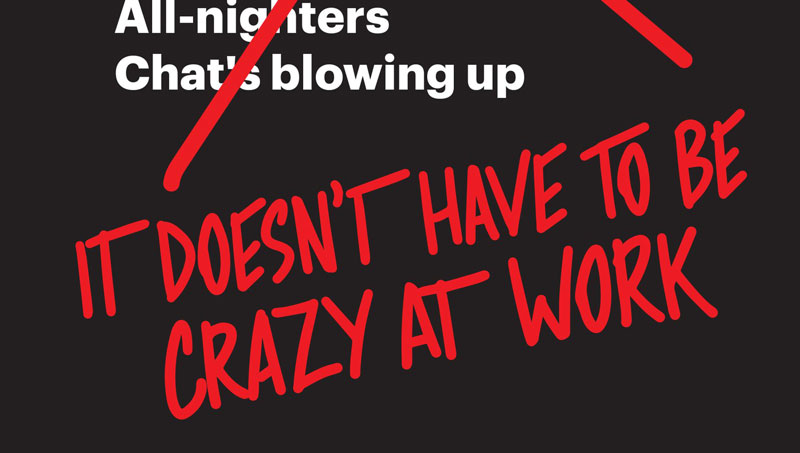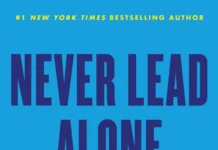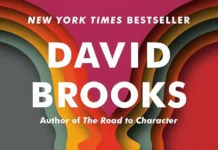by Dianna Brodine, managing editor
Plastics Business
On my bulletin board at work, I have a small business card-sized reminder. It reads, “There’s no point in doing well that which you should not be doing at all.”
That card was given to me – and every other attendee – in 2012 at a MAPP Benchmarking & Best Practices Conference by speaker and author Tom Connellan. For six years, it’s served as a reminder that working hard does no good if I’m not working on the right things. It’s a reminder to prioritize – to strategize – to understand what truly makes a difference and what does not.
It’s easy to say, “yes.” It’s easy to take on the projects that you know you can do better or faster than the team you should be delegating them to. It’s easy to follow a grand idea. But, those things are rarely productive, and they often distract from the tasks that need to be done for your business – or personal life – to succeed.
It Doesn’t Have to Be Crazy at Work
Author: Jason Fried and David Heinemeier Hannson
Released: Oct. 2, 2018
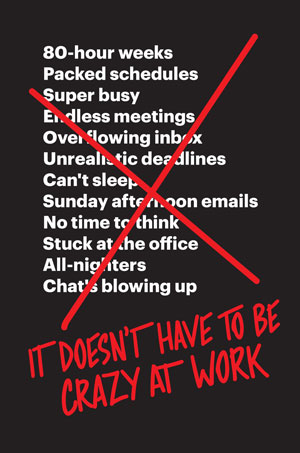 In this timely manifesto, the authors of the New York Times bestseller Rework broadly reject the prevailing notion that long hours, aggressive hustle and “whatever it takes” are required to run a successful business today. In Rework, Jason Fried and David Heinemeier Hansson introduced a new path to working effectively. Now, they build on their message with a bold, iconoclastic strategy for creating the ideal company culture – what they call “the calm company.” Their approach directly attacks the chaos, anxiety and stress that plague millions of workplaces and hamper billions of workers every day. Long hours, an excessive workload and a lack of sleep have become a badge of honor for modern professionals. But it should be a mark of stupidity, the authors argue. The answer to better productivity isn’t more hours – it’s less waste and fewer things that induce distraction and persistent stress. Destined to become the management guide for the next generation, It Doesn’t Have to Be Crazy at Work is a practical and inspiring distillation of their insights and experiences. It isn’t a book telling you what to do. It’s a book showing you what they’ve done – and how any manager or executive, no matter the industry or size of the company, can do it, too.
In this timely manifesto, the authors of the New York Times bestseller Rework broadly reject the prevailing notion that long hours, aggressive hustle and “whatever it takes” are required to run a successful business today. In Rework, Jason Fried and David Heinemeier Hansson introduced a new path to working effectively. Now, they build on their message with a bold, iconoclastic strategy for creating the ideal company culture – what they call “the calm company.” Their approach directly attacks the chaos, anxiety and stress that plague millions of workplaces and hamper billions of workers every day. Long hours, an excessive workload and a lack of sleep have become a badge of honor for modern professionals. But it should be a mark of stupidity, the authors argue. The answer to better productivity isn’t more hours – it’s less waste and fewer things that induce distraction and persistent stress. Destined to become the management guide for the next generation, It Doesn’t Have to Be Crazy at Work is a practical and inspiring distillation of their insights and experiences. It isn’t a book telling you what to do. It’s a book showing you what they’ve done – and how any manager or executive, no matter the industry or size of the company, can do it, too.
Tools of Titans: The Tactics, Routines, and Habits of Billionaires, Icons and World-Class Performers
Author: Timothy Ferriss
Released: Dec. 6, 2016
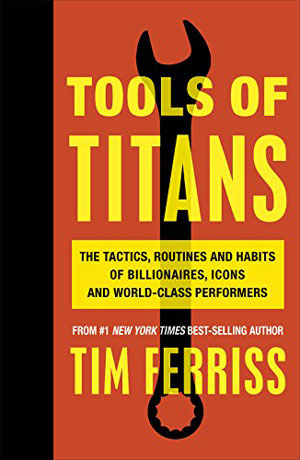 From Tim Ferriss: For the last two years, I’ve interviewed more than 200 world-class performers for my podcast, The Tim Ferriss Show. The guests range from super celebs (Jamie Foxx, Arnold Schwarzenegger, etc.) and athletes (icons of powerlifting, gymnastics, surfing, etc.) to legendary Special Operations commanders and black-market biochemists. What makes the show different is a relentless focus on actionable details. This is reflected in the questions. For example: What do these people do in the first 60 minutes of each morning? What do their workout routines look like, and why? What books have they gifted most to other people? What are the biggest wastes of time for novices in their field? What supplements do they take on a daily basis? Everything within these pages has been vetted, explored and applied to my own life in some fashion. I’ve used dozens of the tactics and philosophies in high-stakes negotiations, high-risk environments or large business dealings. I created this book, my ultimate notebook of high-leverage tools, for myself. It’s changed my life, and I hope the same for you.
From Tim Ferriss: For the last two years, I’ve interviewed more than 200 world-class performers for my podcast, The Tim Ferriss Show. The guests range from super celebs (Jamie Foxx, Arnold Schwarzenegger, etc.) and athletes (icons of powerlifting, gymnastics, surfing, etc.) to legendary Special Operations commanders and black-market biochemists. What makes the show different is a relentless focus on actionable details. This is reflected in the questions. For example: What do these people do in the first 60 minutes of each morning? What do their workout routines look like, and why? What books have they gifted most to other people? What are the biggest wastes of time for novices in their field? What supplements do they take on a daily basis? Everything within these pages has been vetted, explored and applied to my own life in some fashion. I’ve used dozens of the tactics and philosophies in high-stakes negotiations, high-risk environments or large business dealings. I created this book, my ultimate notebook of high-leverage tools, for myself. It’s changed my life, and I hope the same for you.
Essentialism: The Disciplined Pursuit of Less
Author: Greg McKeown
Released: April 15, 2014
 Have you ever felt the urge to declutter your work life? Do you often find yourself stretched too thin? Do you simultaneously feel overworked and underutilized? Are you frequently busy but not productive? Do you feel like your time is constantly being hijacked by other people’s agendas?
Have you ever felt the urge to declutter your work life? Do you often find yourself stretched too thin? Do you simultaneously feel overworked and underutilized? Are you frequently busy but not productive? Do you feel like your time is constantly being hijacked by other people’s agendas?
If you answered yes to any of these, the way out is the Way of the Essentialist. It isn’t about getting more done in less time. It’s about getting only the right things done. It is not a time management strategy or a productivity technique. It is a systematic discipline for discerning what is absolutely essential, then eliminating everything that is not, so we can make the highest possible contribution toward the things that really matter. By forcing us to apply more selective criteria for what is essential, the disciplined pursuit of less empowers us to reclaim control of our own choices about where to spend precious time and energy – instead of giving others the implicit permission to choose for us.
Smarter Faster Better: The Transformative Power of Real Productivity
Author: Charles Duhigg
Released: March 8, 2016
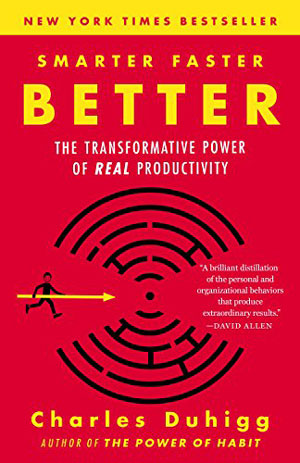 At the core of Smarter Faster Better are eight key productivity concepts – from motivation and goal setting to focus and decision making – that explain why some people and companies get so much done. Drawing on the latest findings in neuroscience, psychology and behavioral economics – as well as the experiences of CEOs, educational reformers, four-star generals, FBI agents, airplane pilots and Broadway songwriters – this painstakingly researched book explains that the most productive people, companies and organizations don’t merely act differently. They view the world, and their choices, in profoundly different ways.
At the core of Smarter Faster Better are eight key productivity concepts – from motivation and goal setting to focus and decision making – that explain why some people and companies get so much done. Drawing on the latest findings in neuroscience, psychology and behavioral economics – as well as the experiences of CEOs, educational reformers, four-star generals, FBI agents, airplane pilots and Broadway songwriters – this painstakingly researched book explains that the most productive people, companies and organizations don’t merely act differently. They view the world, and their choices, in profoundly different ways.
They know that productivity relies on making certain choices. The way we frame our daily decisions; the big ambitions we embrace and the easy goals we ignore; the cultures we establish as leaders to drive innovation; the way we interact with data: These are the things that separate the merely busy from the genuinely productive. In The Power of Habit, Pulitzer Prize-winning journalist Charles Duhigg explained why we do what we do. In Smarter Faster Better, he applies the same relentless curiosity, deep reporting and rich storytelling to explain how we can improve at the things we do. It’s a groundbreaking exploration of the science of productivity, one that can help anyone learn to succeed with less stress and struggle, and to get more done without sacrificing what we care about most – to become smarter, faster and better at everything we do.

